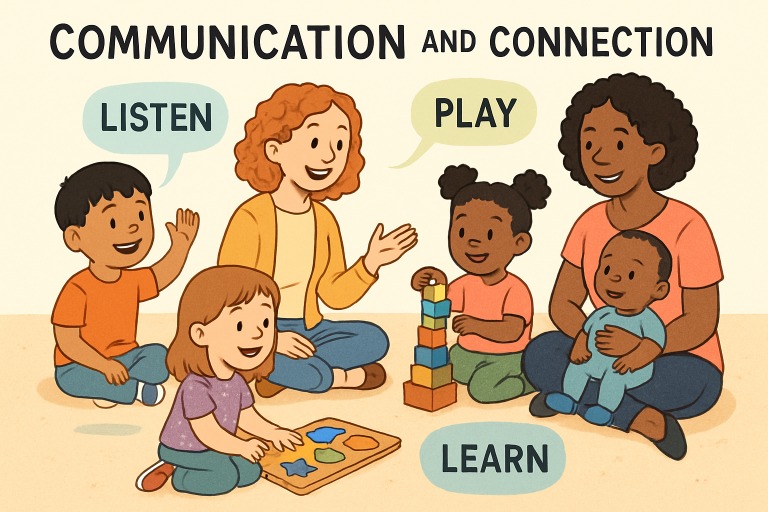The Power Of Early Intervention
When autism is recognized in the early years, early intervention plays a vital role in shaping a child’s developmental path. With timely, specialized support, children gain greater opportunities to build essential communication, social, and daily living skills. Families and therapists who begin intervention before age three often create a strong foundation for future academic achievement and social growth.
Communities that emphasize early autism support, such as those available in North Carolina, highlight the importance of accessible resources. Families can explore options like https://www.brighterstridesaba.com/locations/north-carolina to connect with expert guidance and therapies that help children engage more fully in school and community life. Early access to these services builds critical developmental skills and reduces long-term challenges. Children can gain confidence and independence in their daily routines with consistent support. Ultimately, investing in early intervention empowers families to create brighter, more hopeful futures for their children.
What Science Says About Early Autism Support
A wealth of scientific research supports the value of early autism intervention. According to the Centers for Disease Control and Prevention (CDC), high-quality early intervention can improve learning, communication, social skills, and underlying brain development. Studies consistently show that children who receive tailored intervention between ages 2 and 5 demonstrate improvements in IQ, adaptive behavior, and overall functioning compared to those who start therapies later.
These positive outcomes are not limited to academic achievement but also include greater independence in adulthood. Research highlights that early support reduces the need for specialized services in later years, making these investments critical not just for the child but for society as a whole.
Common Signs Parents Should Watch For
Recognizing the early characteristics of autism can empower parents to seek help before significant delays develop. Common signs include limited eye contact, lack of shared attention (such as pointing to show interest), delays in speech or babbling, highly repetitive behaviors, and unusual sensitivities to sounds or textures. Other red flags might include not responding to their name, lack of interest in interacting with others, or regression in skills previously acquired.
If you notice these signs—especially if several are present—consult your pediatrician and ask for a developmental screening. Early diagnosis is key to providing your child with the necessary resources to thrive.
Collaborative Care: The Family’s Role
Families are central to the success of any early intervention program. When parents and caregivers collaborate closely with therapists, educators, and pediatricians, interventions are more likely to be effective and sustainable. Integrating strategies into everyday routines—from meals to playtime—ensures that children are consistently supported and encouraged across all settings.
Family involvement also helps professionals tailor techniques to align with unique family values, cultures, and practical circumstances. Open communication and regular feedback sessions keep everyone on the same page and maximize developmental progress.
Techniques And Approaches
Evidence-based early autism interventions often include play-based learning, behavioral therapies, and assistive communication tools. For example, Applied Behavior Analysis (ABA) breaks down complex tasks into manageable steps and rewards positive behaviors. Speech and occupational therapy can support language development and motor coordination, while visual aids or picture exchange systems give nonverbal children new communication methods.
Many programs incorporate parent training so that skills learned in therapy sessions can be generalized at home and in the community. To see various intervention models in action, Autism Speaks offers a detailed overview of autism treatment options.
Answers To Common Questions
How early can signs of autism appear?
Signs of autism can appear as early as 12-18 months. By two years old, developmental differences are often more pronounced.
When should families seek a developmental evaluation?
If a parent has concerns, regardless of age, the best time to seek evaluation is now. Your pediatrician can refer you to a developmental specialist or early intervention program.
What professionals are involved in early intervention?
Developmental pediatricians, speech and occupational therapists, ABA therapists, and educators all support young children with autism.
How do I advocate for support in preschool or kindergarten?
Understanding your child’s rights is essential. Review resources like how the IEP process works for children with special needs, and never hesitate to communicate your child’s specific strengths and needs to their teachers.
The Value Of Community Support
No family should feel they have to navigate autism alone. National and local organizations, such as support groups and advocacy networks, provide information, practical strategies, and emotional support. These resources help families build relationships with others on similar journeys and open new avenues for community understanding and acceptance.
Consider reading the family tool kits from Autism Speaks and connecting with early intervention centers in your area to learn about educational workshops and support programs.
Looking Forward: The Lasting Benefits
The impact of early autism intervention lasts a lifetime. Children who receive support at an early age are more likely to develop meaningful relationships, communicate their needs, and enjoy greater independence as adults. Many become strong self-advocates and contributors in their communities. The collective efforts of families, therapists, and communities today pave the way for brighter, empowered futures.
Early autism intervention provides children with vital tools to build communication, social, and daily living skills that support long-term growth. Families and therapists address challenges during formative years to lay the groundwork for greater independence and confidence. With timely support, children are better equipped to thrive academically, socially, and emotionally, creating opportunities for more fulfilling participation in school, community, and life.


